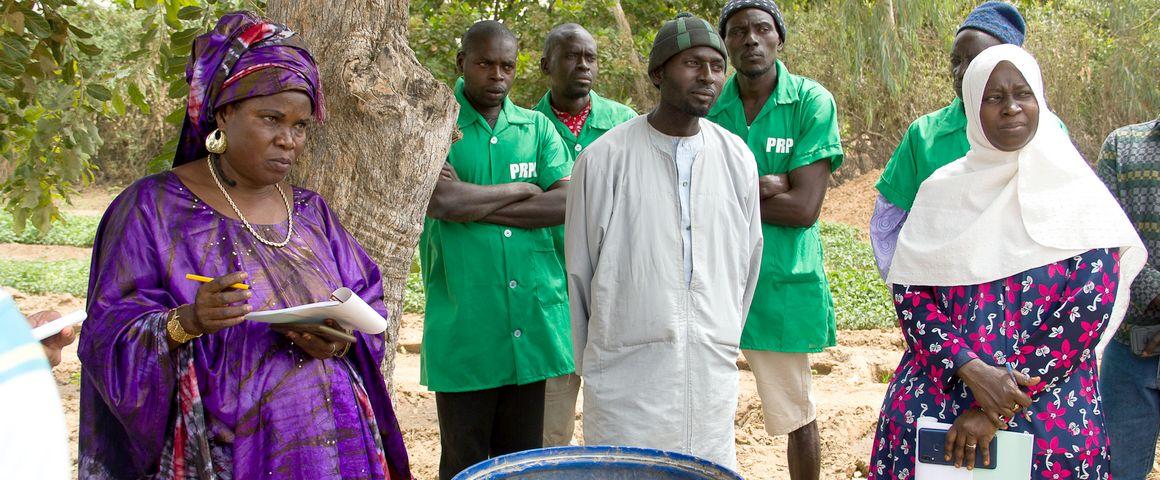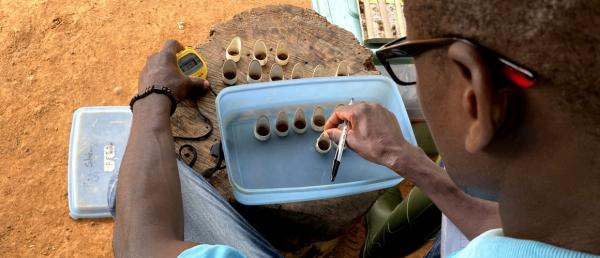Results & impact 16 April 2024
- Home
- CIRAD news
- News
- Ebola community-based surveillance system
Ebola: building an effective community-based surveillance system

© R. Belmin, CIRAD
West Africa is a region that is highly exposed to the risk of viral hemorrhagic fevers. In this poor region, the inadequacy of the health system means any outbreak may become impossible to control, as was the case with the Ebola epidemic between 2013 and 2016.
Community-based surveillance systems are public health tools that are particularly well suited to local conditions: they are based on the detection of disease outbreaks within a community by its own members. How can the effectiveness of community-based surveillance systems be maximised?
Researchers from the ASTRE research unit at CIRAD, in collaboration with the Faculty of Veterinary Medicine at Kasetsart University in Bangkok and the National Directorate for Veterinary Services of the Republic of Guinea, have answered this question in Guinea in an article published in the journal PLoS Neglected Tropical Diseases.
For three months, the team conducted interviews with community members to assess their knowledge and perceptions of diseases. “We adopted a participatory epidemiology approach”, says Marie-Jeanne Guenin, a doctoral student at CIRAD and co-author of the study. “This has enabled us to identify the obstacles and to integrate the knowledge of the community members in order to set up a surveillance system tailored to local conditions”.
One Health: integrated human, animal and ecosystem health
These findings reveal considerable heterogeneity of knowledge within the community: for example, community health workers have more in-depth knowledge of diseases than the groups of women interviewed, who are nevertheless involved in healthcare for their whole family.
Another notable finding is the lack of knowledge about wildlife diseases, especially among rangers and hunters, who are nevertheless a vital link. The originality of the study lies in the One Health approach adopted, whose contribution to strengthening and improving surveillance systems is recognised. “This integrated approach has enabled us to include the actors from each of the health sectors: human, animal and environmental”, says Flavie Goutard, an epidemiologist at CIRAD and co-author of the study. “Good ecosystem health is based on these three pillars of One Health. Unfortunately, environmental health is often not considered a priority in these studies”.
This research was conducted in the context of the EBO-SURSY project, financed by the European Union and coordinated by the World Organisation for Animal Health. “This qualitative study focuses on a small community, but it will produce assumptions that can then be tested on a larger scale in other projects due to be launched, such as BCOMING or AFRICAM”, says Flavie Goutard.
Indeed, these activities will continue in the context of PREZODE, among others. This ambitious initiative is aimed at improving surveillance and early warning systems in order to prevent pandemics. It was launched by Emmanuel Macron in January 2021 at the One Planet Summit. Initiated and coordinated by CIRAD, INRAE and IRD, PREZODE brings together almost 1 500 scientists from 122 different countries.
The advantages of participatory epidemiology
The findings obtained in Guinea are the first steps towards a more effective community-based surveillance system. “It is important to strike a balance between the sensitivity (capacity to detect a disease) and the specificity (capacity to correctly identify a disease) of the surveillance system”, says Marie-Jeanne Guenin. “Based on our findings, we will thus be able to build optimal case definitions (criteria for identifying a disease)”.
It is now necessary to characterise the means of communication that are most suited to centralising information. The study shows that some communication channels are more effective and are preferred, and research is already underway to enhance these initial findings by including disciplines such as the social sciences and economics.
“Our objective is to develop an approach that can be replicated in other countries (Cambodia, Madagascar, etc.), with surveillance systems that are tailored to each community, enabling the detection of global outbreaks”, says Flavie Goutard. The participatory epidemiology approach shows its value here in the development of a more effective surveillance system. It also helps to increase the acceptability and sustainability of the surveillance system thanks to the discussions launched with local communities.
The recent dramatic health crises affecting Africa and the rest of the world have highlighted the urgent need to improve capacities for the detection of emerging diseases.
























_C.Chabrier.JPG)

